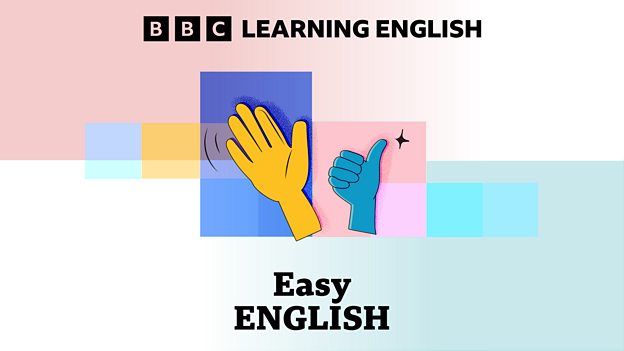6 Minute English
Intermediate level
Rage bait: How online anger makes money
Episode 250213 / 13 Feb 2025

_____________________________________________________________________________________________________
Download a free 6 Minute English worksheet!
Download a free transcript!
______________________________________________________________________________________________________
Try more episodes of 6 Minute English:
______________________________________________________________________________________________________
Introduction
How do people make money from rage bait? Beth and Phil discuss this and teach you some new vocabulary.
This week's question
Both 'clickbait' and 'rage bait' contain the word, 'bait', but what is its actual meaning? Is bait:
a) a strong feeling of anger?
b) food put on a hook to catch fish or animals? or,
c) a piece of computer software?
Listen to the programme to hear the answer.
Vocabulary
rage bait
social media content designed to provoke an emotional reaction so that people engage with the content thereby generating income for the online creator
the more (X)… the more (Y)…
as one thing (X) happens repeatedly, another thing (Y) happens more as a result
incite
encourage someone to do or feel something unpleasant or violent; stir up; provoke; rouse
manipulative
trying to influence or control someone to your advantage
eyeballs
the number of people viewing a particular website, television programme etc.
biases
feelings, often hidden or unconscious, either for or against an idea or a group of people
TRANSCRIPT
Note: This is not a word-for-word transcript.
Phil
Hello, this is 6 Minute English from BBC Learning English, I'm Phil.
Beth
And I'm Beth.
Phil
If you use the internet, and nearly everyone does, you’ve probably read headlines like this:
You won’t believe what plastic surgery this celebrity has had done!
Known as clickbait, headlines like these are used to grab your attention and make you read more.
Beth
But now, a new trend called rage bait is spreading across social media. Rage bait is online content designed to make you angry or outraged.
In this programme, we’ll explore the trend of rage-baiting, and, as usual, we’ll learn some useful new vocabulary, all of which you can find on our website, bbclearningenglish.com.
Phil
Great, but first it’s time for my question, Beth, which is about the two terms we’ve been using: 'clickbait' and 'rage bait'. Both contain the word, 'bait', but what is its actual meaning? Is bait:
a) a strong feeling of anger?
b) food put on a hook to catch fish or animals?
c) a piece of computer software?
Beth
I am fairly confident that it is b) – food put on a hook.
Phil
OK. Well, we'll find out the correct answer later in the programme. Here’s how rage bait works: a creator posts a provocative piece of content online, a message maybe, or a video. People see it, feel outraged, and comment angrily. Others see it, like it and share it around. Either way, the content creates interest, increases internet traffic and makes money for the creator. Here’s marketing strategist, Andrea Jones, explaining more to Megan Lawton, presenter of BBC World Service programme, Business Daily:
Andrea Jones
The more content they create, the more engagement they get, the more that they get paid. And so they will do anything… some creators will do anything to get more views because the more views they get, the more that they get paid, even if, even if, those views are negative or inciting rage and anger in people.
Megan Lawton
Andrea, how is rage bait different to clickbait or other online tactics? […]
Andrea Jones
As a marketer, I'm always, you know, coaching my clients and talking to them about using hooks in their marketing, right? And I think the difference between a hook and rage bait or even its long-lost cousin, clickbait content… When we think about a hook, to me a hook accurately reflects what's in that piece of content and it comes from a place of trust, whereas rage-baiting content is designed to be manipulative.
Beth
Andrea says the more reaction a post gets, the more money the creator makes, even if the reactions are hateful. She uses the structure, the more one thing happens, the more something else happens, to show that as one thing happens repeatedly, so another thing increases as a result. For example, the more you practise English, the more you’ll improve.
Phil
It doesn’t matter that the content is designed to incite outrage – to encourage unpleasant or violent reactions. That’s why Andrea thinks rage bait is worse than clickbait. While clickbait is more truthful about its content, rage bait is manipulative, meaning it tries to influence something to its own advantage.
Beth
So, it’s not hard to see why many people think rage bait is toxic. So, if you’re wondering why people react in the first place, listen as Dr William Brady explains the psychology behind rage bait to BBC World Service’s, Business Daily:
Dr William Brady
If you are an influencer and you want to figure out, ‘Well, how do I get more eyeballs on my content?’ Well, you need to exploit those biases we have in our psychology because that's the content we’ll pay more attention to. In turn that's the content that algorithms will amplify, which ultimately means more advertising revenue.
Phil
Influencers want more eyeballs on their content – more people to view their website or social media posts – and use human psychology to do it. Psychologically speaking, we all have biases – feelings – which are often unconscious, either for or against a certain idea or group of people.
Beth
Biases are emotional, and since listening to our emotions has been vital to the evolution of the human species, creators know that provoking our emotions will grab our attention.
Phil
So, what can be done to combat rage bait? Well, we could all take a moment to think before reacting. And remember that by sharing something outrageous you might be making things worse, while also making the creator richer.
Beth
OK, Phil, let’s reveal the answer to your question. You asked me what 'bait' is.
Phil
I did. And the correct answer is b) food put on a hook to catch a fish or an animal, and isn’t that what you said, Beth?
Beth
It is, yes.
Phil
Right again! OK, let’s recap the vocabulary we’ve learned in the programme, starting with rage bait, social media content designed to provoke anger, thereby encouraging people to engage with it.
Beth
The structure, the more… the more… describes the situation when one thing happening repeatedly results in another thing happening too.
Phil
To incite someone means to encourage them to do or feel something unpleasant or violent.
Beth
The adjective, manipulative, describes trying to influence or control someone to your own advantage.
Phil
Eyeballs is an informal word for the number of people viewing a particular website or television programme.
Beth
And finally, biases are feelings, often unconscious, either for or against an idea or a group of people. Once again, our six minutes are up. Goodbye for now!
Phil
Bye!
Latest 6 Minute English

How can we help wild bees?
Episode 250717 / 17 Jul 2025
Did you know that many species of wild bees are endangered in the UK? What can we do to help?

Do you need to declutter your home?
Episode 250710 / 10 Jul 2025
Is your home neat and tidy? Or is it full of stuff you no longer need? You might need to declutter!

How do you say sorry?
Episode 250703 / 03 Jul 2025
Different cultures apologise in different ways. How do people say sorry where you are from?

Are plant-based substitutes healthier than meat?
Episode 250626 / 26 Jun 2025
Processed meat has been shown to be bad for our health, but are plant-based meat substitutes any healthier?

How do babies communicate?
Episode 250619 / 19 Jun 2025
What does it mean when newborn babies wave their arms and legs about?

Can climate change affect our mental health?
Episode 250612 / 12 Jun 2025
Is your mental health being affected by climate change?

How important is politeness?
Episode 250605 / 05 Jun 2025
How would you greet somebody you didn't know?

What's your favourite kind of noodle?
Episode 250529 / 29 May 2025
How much do you know about noodles?


Which cooking oil is the best?
Episode 250515 / 15 May 2025
Are some cooking oils better for your health than others?

Should animals be kept in zoos?
Episode 250508 / 08 May 2025
Are zoos an important scientific resource, or an unnecessary abuse of animal rights?

Can cows prevent wildfires?
Episode 250501 / 01 May 2025
How are cows helping to prevent wildfires in Spain?

How climate change affects animal migration
Episode 250424 / 24 Apr 2025
How is climate change affecting animal migration?

Can AI solve crime?
Episode 250417 / 17 Apr 2025
Could artificial intelligence be used to solve a murder?


Are we getting more allergic to things?
Episode 250403 / 03 Apr 2025
Do you know anyone who has 50+ allergies?

Can we boost the immune system?
Episode 250327 / 27 Mar 2025
Can ginger shots, turmeric and cold water swimming boost your immune system?


Should we eat less rice?
Episode 250313 / 13 Mar 2025
Is it possible to grow rice in a more eco-friendly way?



Young women on social media
Episode 250220 / 20 Feb 2025
How do women in different countries experience the online world?

Rage bait: How online anger makes money
Episode 250213 / 13 Feb 2025
How do people make money from rage bait?



How the world learned to love fast food
Episode 250123 / 23 Jan 2025
How did fast food spread around the world?

Which country has the best schools?
Episode 250116 / 16 Jan 2025
How do you compare education systems?

Eating 50-year-old stew
Episode 250109 / 09 Jan 2025
Would you eat a stew that's been in a pot for 50 years?

Are you drinking enough water?
Episode 250102 / 02 Jan 2025
How much water do you drink every day? Is it enough?







